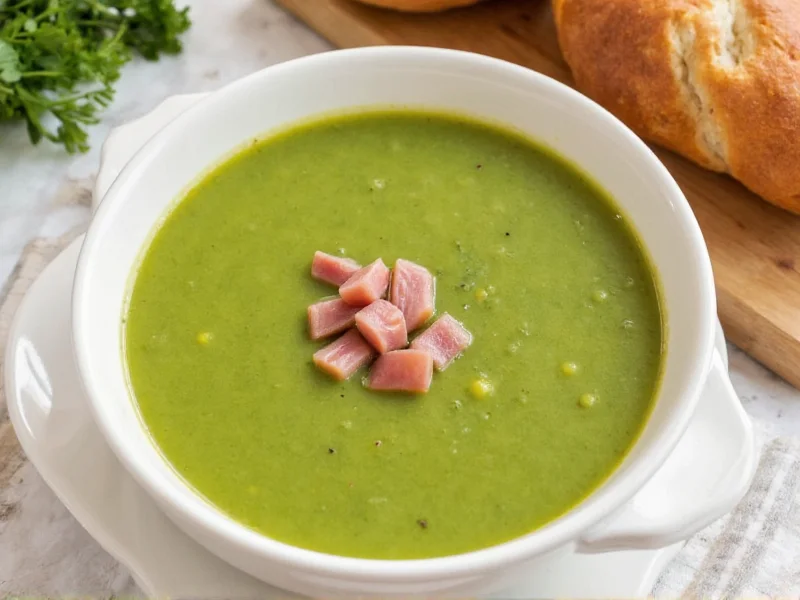The Essential Guide to Perfect Pea Soup with Ham
Pea soup with ham represents one of the world's most enduring comfort food traditions, with roots tracing back to medieval Europe. This humble dish transformed from peasant fare into a culinary staple through its remarkable balance of nutrition, affordability, and satisfying flavor. The magic happens when split peas release their natural starch during slow cooking, creating a velvety texture without any dairy, while smoked ham provides depth that elevates the entire dish.
Why This Recipe Works
Successful pea soup with ham depends on understanding the science behind the ingredients. Split peas (not to be confused with fresh green peas) contain high starch content that breaks down during cooking, naturally thickening the soup. The collagen in ham hock transforms into gelatin during simmering, creating that signature rich mouthfeel. Unlike many online recipes that cut corners, authentic preparation requires patience—rushing the cooking process results in either chalky peas or a thin, watery broth.
Traditional Ingredients and Their Purpose
Each component serves a specific function in creating balanced flavor and texture. Understanding these roles helps with successful substitutions when needed.
| Ingredient | Function | Key Selection Tip |
|---|---|---|
| Green split peas | Natural thickener and protein base | Choose uniformly colored peas without cracks |
| Ham hock or shank | Flavor foundation and collagen source | Smoked variety provides deeper flavor |
| Mirepoix (carrots, celery, onion) | Aromatic base and flavor complexity | Fresh, not pre-cut for best flavor release |
| Bay leaves | Earthy undertone without overpowering | Remove before serving to prevent bitterness |
Step-by-Step Preparation Guide
Proper Ingredient Preparation
Begin by sorting through 2 cups of split peas, removing any debris. Rinse thoroughly under cold water until the water runs clear—this prevents cloudiness in your finished soup. For the ham component, if using a ham hock, score the fat cap in a diamond pattern to help render fat and release flavor. Chop 1 large onion, 2 carrots, and 2 celery stalks into uniform 1/4-inch pieces to ensure even cooking.
The Critical Simmering Process
Combine ingredients in a heavy-bottomed pot with 8 cups of liquid (water or low-sodium broth). Bring to a gentle boil, then immediately reduce to the barest simmer. This slow cooking process, maintained for 60-90 minutes, allows the peas to break down gradually while the ham releases its flavor compounds. Skim any foam that rises to the surface during the first 15 minutes for a cleaner-tasting soup. The soup is ready when peas have completely disintegrated and the ham meat pulls away easily from the bone.
Common Mistakes That Ruin Pea Soup
Many home cooks make critical errors when preparing pea soup with ham that compromise texture and flavor. Adding salt too early causes peas to toughen—wait until the peas have softened significantly. Using high heat creates uneven cooking where peas on the bottom burn while others remain undercooked. Overlooking the importance of acidic ingredients means missing an opportunity to brighten the rich flavors; a splash of apple cider vinegar added at the end balances the soup perfectly.
Regional Variations Worth Trying
While the basic recipe remains consistent, cultural adaptations offer interesting twists. Scandinavian versions often include a touch of marjoram and serve with crispbread. In the American South, some cooks add a pinch of red pepper flakes for subtle heat. Canadian preparations sometimes incorporate maple syrup for a hint of sweetness that complements the smokiness. For a modern twist, try finishing with fresh lemon zest to lift the earthy flavors.
Storage and Reheating Best Practices
Properly stored pea soup with ham actually improves in flavor after 24 hours as ingredients meld. Cool completely before transferring to airtight containers. Refrigerate for up to 5 days or freeze for up to 3 months. When reheating, add liquid gradually as the soup thickens considerably when chilled. For frozen portions, thaw overnight in the refrigerator before reheating gently over medium-low heat to preserve texture.
Frequently Asked Questions
Can I make pea soup with ham without a ham hock?
Yes, you can substitute with 1½ cups of diced smoked ham and 4 cups of quality ham bone broth. While not identical to the collagen-rich texture from a hock, this alternative still delivers authentic flavor. For vegetarian versions, use smoked paprika with liquid smoke and mushrooms for umami depth.
Why is my pea soup with ham too thin?
Thin pea soup usually results from insufficient cooking time or using too much liquid. The natural starch in split peas needs 60-90 minutes of gentle simmering to fully release. If your soup remains thin, remove the ham, puree 1-2 cups of soup, then return to the pot. Avoid flour or cornstarch thickeners as they alter the authentic texture.
How do I prevent pea soup from boiling over?
Pea soup bubbles vigorously due to starch content. To prevent boil-overs, maintain a bare simmer rather than a rolling boil, leave ample headspace in your pot (no more than 2/3 full), and place a wooden spoon across the top of the pot. The spoon breaks bubbles before they can build up. Stir occasionally but not constantly to allow proper thickening.
What's the best way to use leftover ham in pea soup?
Leftover ham works beautifully in pea soup. Chop into 1/2-inch cubes and add during the last 15 minutes of cooking to prevent overcooking and toughness. For maximum flavor, simmer ham bone in the cooking liquid for 30 minutes before adding peas, then remove before serving. Leftover soup freezes exceptionally well for quick future meals.
How can I enhance the flavor of store-bought pea soup?
Revitalize canned pea soup by sautéing fresh mirepoix until caramelized, then adding to the soup with a smoked ham hock. Simmer for 30 minutes to develop flavors. Finish with fresh herbs, a splash of vinegar, and cracked black pepper. The key is building layers of flavor rather than relying solely on the pre-made base.











 浙公网安备
33010002000092号
浙公网安备
33010002000092号 浙B2-20120091-4
浙B2-20120091-4